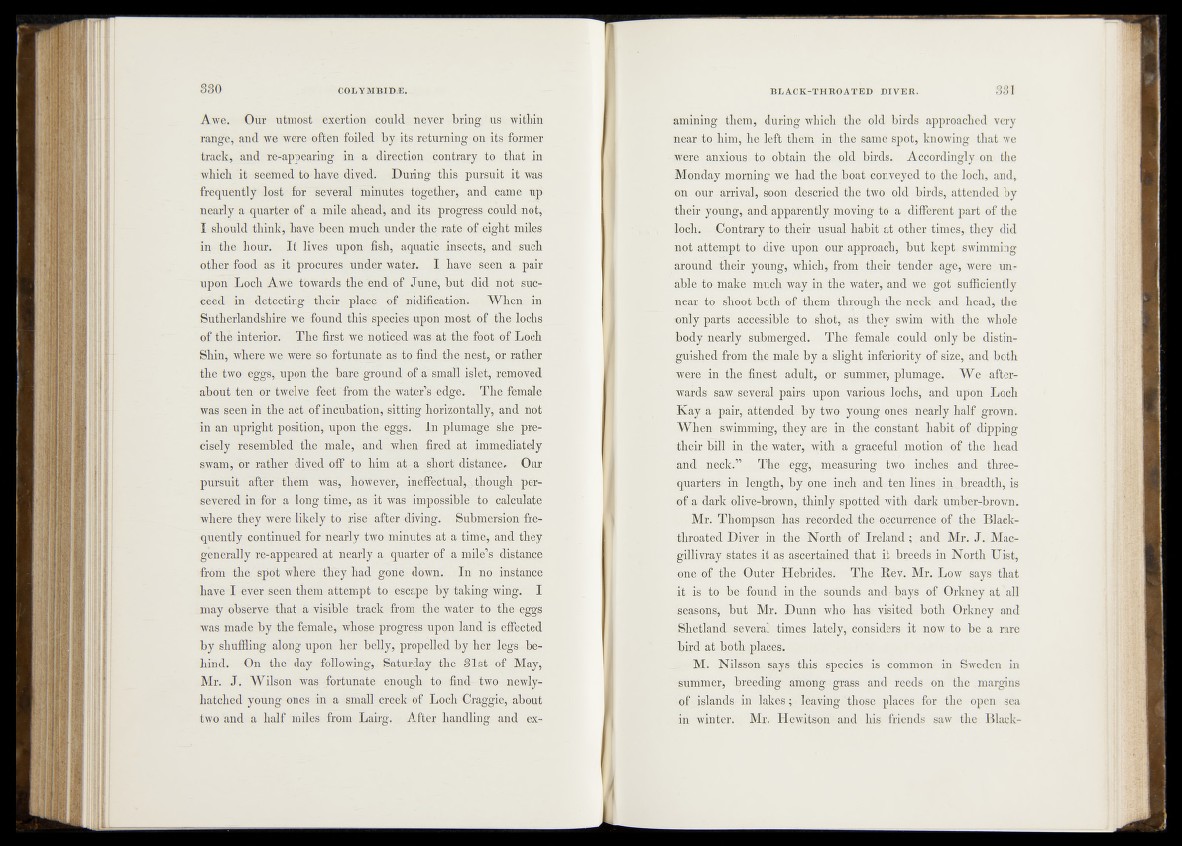
Awe. Our utmost exertion could neyer br.ing: us within
range, and we were often foiled by its' returning; on its former
track, and re-appearing in a direction contrary to - that-in
which it seemed to have dived. During this pursuit it was
frequently lost for several minutes together, and came up
nearly a -quarter of a mile ahead', and.*its progress?could not,
I should think, have teen much under the rath of eight miles
in the hour. I t lives upon fish, aquatic. insects, and such
other food as it procures under water. I havej&qen, a pair
upon 'Doch Awe towards the end of June, hut did nat^snc?
ceed in : detecting - their place-of nidificatiom When in
Sutherlandshire we found this species-upon most of the lochs
of thé interior. The first we noticed was at the foht5 of Loch
Shin, where we were so-fortunate as to find the nest,'or rather
the two eggs, upon the bare ground of,a small islet, removed
about ten or twelve feet from the water’s edge. ;.~The female
was seen in the act of incubatit>nj-,sittin’g?horizontally, and nfit
in an upright position,-upon tbejeggs.V/ In plumage ..sfie, precisely
resembled the" male, and vrhefl^fired &t immediately
swam, or rather dived off-to him at a short distance^- Our
pursuit after thém was, howeveé^tduefféctüal^^hough persevered
in for a long time, .as it was impossible .-to calculate
where they weïéF likely to rise after dmng. . Subinersion frequently
continued for: neatly two minutes at a. time, and they
generally re-appeared at nearly a quarter of a mile’s-.distance
from the:.spot where they had gone down. In no instance
have I ever seen them attempt to escape- by taking wing. I
may observe- that a visible .track from the water to the eggs
was made by the female, whose progress upon land is effected
by shuffling along upon her belly, propelled by h e r . legs * behind.
On the day following, Saturday the 31st of May,
Mr. J . Wilson was. fortunate enough to find two newly-
hatched young ones in a small creek of Loch Craggie, about
two and a half miles from Lairg. After handling and ex-
»mining them, during which the old birds approached very
near to him’, he left;them, in the same spot, knowing that we
were anxious to obtain the old birds. Accordingly on the
Monday morning we had the boat conveyed to the loch, and,
on our arrival,^soon descried the two old birds, attended by
their young, and apparently moving to a different part of the
loch. Contrary to their usfial habit at other times,, they did
not attempt to dive upon our approach, but kept- swimming
around theifUyqung, whichjf from -their, tender age, were unable
to .make much way in the water, and we got sufficiently
near to^jppotJboth-of them through the -neck? and head, the
only parts -accessible ^o^shqtsj^as .they- swim with the whole
body nearly submerged. The'female could only be distinguished
from the male by a slight inferiority of size, and both
fwere in the finest adult, or summer, plumage. We afterwards
saw-several-pairs upon various lochs, and upon Loch
Kay a^paiir, attended. by two young ones nearly half grown.
Wheh^fswimming, they are in the constant habit of dipping
their bill in the water, with a graceful motion of the head
and fleck.” The egg,'- measuring two inches and three-
quarters?-in length, by one. inch and ten fines] in, Jbreadth, is
of* a dar|^adive-brown/-thinly spotted with dark Umber-brown.
, Mr. Thompson has recorded the occurrence of the Black-
throated Diver in the North of .Ireland ;. and Mr. J. Mac-
gilfivray states it as ascertained that it breeds in North Uist,
one of the Outer Hebrides. The Rev. Mr. Low says that
it is -to be-found in the sounds andbays of Orkney at all
seasons, but Mr. Dunn who has visited both Orkney and
Shetland, several times lately, considers it now to be a rare
bird at both places.
M. Nilsson says this species is common in Sweden in
summer, breeding among grass and reeds on the margins
of islands in lakes < leaving those places. for the open sea
in winter. Mr. Hewitson and his friends saw the Black